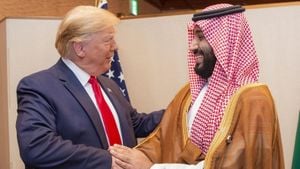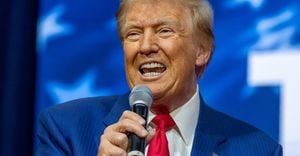Nippon Steel Corp., Japan's largest steelmaker, is pushing to complete its proposed acquisition of United States Steel Corp. by the end of 2024, amid considerable political turbulence. The acquisition, valued at $14.1 billion, including debt, is complicated by uproar from both the outgoing and newly elected U.S. administrations, which are concerned with national security and jobs associated with domestic steel production.
Vice Chairman Takahiro Mori stated, "We are now in a position to make measured discussions," emphasizing optimism about the deal's prospects. Despite the vocal opposition from both outgoing President Joe Biden and president-elect Donald Trump, Mori maintained, "Make no mistake, we can close this deal within the year," noting the importance of discussions post-election as he believes it has set the stage for constructive dialogue.
This acquisition is particularly sensitive due to its timing and the political backdrop. U.S. Steel, based out of Pittsburgh, Pennsylvania—a key swing state—was won back by Trump after Biden secured it during the 2020 elections. The steel industry has significant lobby power, and the United Steelworkers union has strongly voiced opposition, arguing against potential job losses linked to foreign ownership.
The Committee on Foreign Investment in the United States (CFIUS), which is tasked with reviewing foreign acquisitions for any potential risks to national security, has been involved since before the election, extending its review process beyond the electoral period. Mori expressed confidence during his Thursday press conference, indicating the review process has been progressing smoothly. Still, he acknowledged the unpredictable factors brought on by Trump’s administration, stating, "The previous Trump administration said it would attract foreign investment and create new jobs. This (acquisition) is extremely in line with such a policy."
Prior to the election, Biden had asserted the necessity of keeping U.S. Steel as domestically owned. He emphasized, "It is important for us to maintain strong American steel companies powered by American steelworkers; I told our steelworkers I have their backs, and I meant it." The steel workers' union has raised alarms about job security, arguing the merger could threaten their livelihood.
Political and Economic Dynamics
The situation surrounding the potential acquisition is not just about politics—there are significant economic realities at play. Nippon Steel argues the merger will bring much-needed investments to U.S. Steel’s aging plants, particularly those dating back to the late 1800s. They anticipate the deal could prevent facilities from shutting down, citing pre-election warnings from U.S. Steel about possible plant closures if the acquisition were blocked.
Complicators include Trump's recent victory, which aligns with the execution of more protectionist policies. Both he and his vice-president-elect J.D. Vance have emphasized the necessity to prioritize domestic steel production, labeling U.S. manufacturing capabilities as tied directly to national security.
Major business groups, both domestic and international, are urging CFIUS to maintain impartiality amid intense political pressures. A statement from Nippon Steel’s earnings report has expressed confidence, indicating clear backing for the acquisition from major industrial stakeholders. The clear expectation set is for the deal to close within the calendar year of 2024, bolstered by arbitration rulings supporting Nippon Steel's capacity to assume U.S. Steel’s labor obligations.
Looking Ahead
The outcome remains uncertain. Several political currents are at play, and the newly elected administration's approaches to foreign investments are still taking shape. There is considerable uncertainty about whether Trump’s administration will follow through on barring foreign acquisitions, especially after his election rhetoric appears to nearly echo sentiments of intense nationalism.
Nevertheless, Nippon Steel is intensifying its lobbying efforts, having reportedly spent $1.3 million on lobbying from July to September 2024. They are also readying plans for significant investments post-deal, including the establishment of infrastructure projects aimed at revitalizing the U.S. Steel operations.
Political analysts will be watching closely as details of the acquisition emerge over the next few months, as it symbolizes not just business negotiations but broader discussions surrounding America’s manufacturing strategies and foreign investments.
Conclusion
The potential acquisition of U.S. Steel by Nippon Steel is caught at the crossroads of business ambition and national security concerns. With the chip of political power changing hands and union opposition flourishing, the coming months will be telling not just for Nippon Steel but for the future fabric of American steel production.



